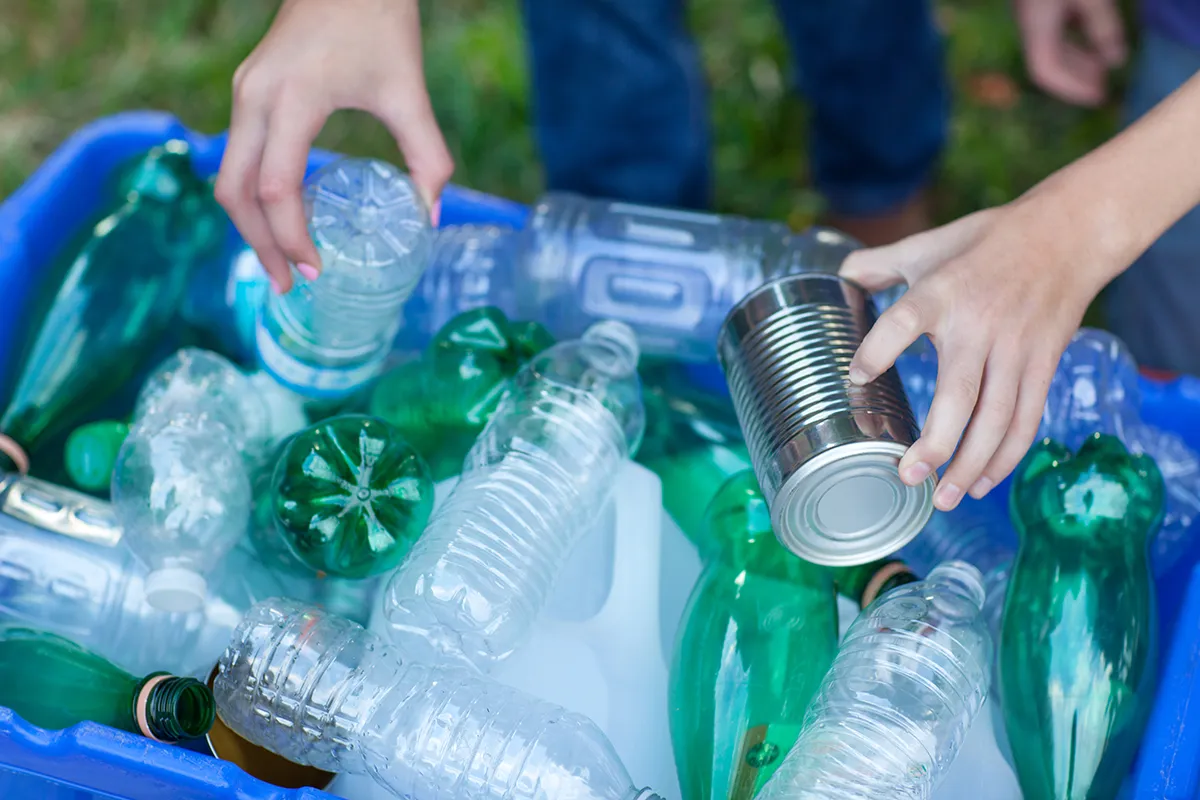Vaughan's Waste Reduction Commitments
The City of Vaughan is a leader in waste management.
The SM4RT Living Plan sets long-term waste reduction targets for garbage and organics. By 2031, the City of Vaughan’s goal is for each household in Vaughan to reduce and recycle an additional bag of garbage per collection, and reduce food waste in organics by planning, shopping and consuming all food purchased.
The City of Vaughan and York Region work together to collect and process household waste
Municipal solid waste is a shared responsibility across all governments. The City operates within a two-tier municipal structure, which means two levels of government provide services to the community – a local municipality and a regional municipality. Vaughan is accountable for managing the curbside collection of residential organics, recycling, garbage and leaf and yard waste and appliance/large metal item collection. In contrast, York Region is responsible for recycling sorting facilities, composting organics, garbage disposal and long-range plans. The provincial and federal governments establish waste regulation and programs and approve and monitor waste management facilities and operations.
Actions citizens can take to reduce waste
Everyone plays a part in keeping the environment clean, green and healthy. What actions do you take to reduce, reuse and recycle? There are many ways to reduce your carbon footprint without having to dramatically change your lifestyle. Here are a few tips to help you make a difference for the environment:
Reduce
- Avoid single-use items by bringing reusable bags, mugs, water bottles and cutlery wherever you go.
- Avoid wasting food by planning and purchasing only what is on your shopping list. Be creative with your leftovers and eat what you buy! Wasted food costs Canadian households more than $1,500 a year.
- Choose items with less packaging when grocery shopping and avoid unnecessary disposable items. Visit a local farmer’s market — they reuse egg cartons and berry baskets, and veggies are typically free of plastic and stickers.
- Avoid plastic altogether. Look for products that come either boxed or in glass or metal containers, as these materials have an infinite number of recycling lifecycles.
- Pack a waste-free lunch. Replace plastic sandwich bags with reusable containers or thermoses.
- Improve your food habits. Proper storage and understanding best-before dates will help stop spoilage and waste. Plan meals for the week and use a shopping list.
- Experiment with a more plant-based diet to reduce related carbon emissions.
- Research products before you buy and consider purchasing things that will last and make durability and reusability your primary decision-making factor — not price.
- Slow down fast fashion. Choose fewer, higher quality items that will last longer. Repurpose textiles as rags to replace paper towels at home, and donate all used clothing and textile items at the York Region Community Environmental Centre in Vaughan at 130 McCleary Court, local second-hand clothing stores or participate in the City’s monthly Curbside Giveaway Days May to October.
- Start a garden. If space allows, trying growing and canning your own food, including veggies and herbs. You can save money and eliminate packaging waste.
Reuse
- Borrow items from local libraries which reduces waste, saves space and resources. Visit a Lendery where you can borrow items such as small kitchen appliances, sports equipment, and tools. A Lendery is now open at the Pierre Berton Resource Library in Vaughan!
- Bring reusable bags with you shopping. Remember to keep some in the car so you won’t forget.
- Donate, swap or buy clothing from thrift stores to give clothes a second life.
- Donate your gently used electronics to friends, family or social programs to extend the life of devices and reduce e-waste.
- Learn how to repair broken appliances and electronics instead of buying new. This reduces the volume of raw materials and energy needed to make new products.
Recycle
- Computers and other electronics in good condition will be properly recycled and/or refurbished.

- Donate gently used items. Local shelters will accept clothing, shoes, blankets, kitchenware and more. For example, you can donate used linens and towels to Vaughan Animal Services. Your donations will help keep kitties and pups warm and dry.
- Take household hazardous waste to a York Region Waste Depot to ensure it is properly disposed of. Not sure what is considered household hazardous waste? Use the what goes where waste sorting tool.
- Did you know that a third of household waste, including kitchen scraps and yard waste, is compostable?
Waste-less Virtual Visits
City staff are offering one-on-one Waste-less Virtual Visit sessions – via FaceTime, WhatsApp, Skype– to help citizens understand how to properly dispose items, reduce landfill and answer any questions related to the City’s waste collection program. To book an appointment, contact Service Vaughan at 905-832-2281 or service@vaughan.ca.
Green Directions Vaughan
Everyone is responsible for their everyday actions that impact the health of this fantastic city. That’s why in 2019, Council adopted the new Green Directions Vaughan initiative. Council first approved it in 2009 as the City of Vaughan’s Community Sustainability and Environmental Master Plan. This long-term plan guides the community to a more sustainable future by addressing environmental, cultural, social and economic values, complementing the goals of York Region’s SM4RT Living Plan. Driven by a definition of sustainability, environmental ethics and a set of principles, Green Directions Vaughan outlines the City’s approach to maintaining a healthy, natural environment, vibrant communities and a strong economy. Learn about opportunities to take more environmentally friendly actions at home and access resources to more information.
